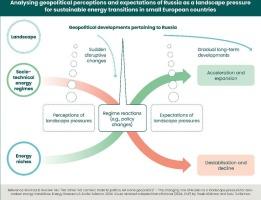"我们宁可不把贸易与政治联系起来,更不用说地缘政治了"--俄罗斯作为零碳能源转型的景观压力,其作用正在发生变化
IF 6.9
2区 经济学
Q1 ENVIRONMENTAL STUDIES
引用次数: 0
摘要
本文旨在通过关注可持续性转型研究中缺失的一个方面:作为能源转型景观压力的地缘政治环境,提出概念性和实证性见解。文章分析了能源超级大国俄罗斯在 2022 年前后是如何成为影响北欧小国能源转型的因素的:爱沙尼亚、芬兰和挪威。文章还提供了正在进行的战争对欧洲能源转型影响的实证研究结果。我们利用转型研究中的 "景观 "概念,通过采访能源与安全关系方面的专家,分析了参与者对这一地缘政治景观转变的看法和预期。景观是利基和社会技术制度的选择环境,影响着它们的运行条件。它包含快速冲击(如战争和大流行病)和缓慢的地缘政治发展,其影响取决于行动者的解释。研究结果表明,在 2022 年之前,尽管三个国家都与俄罗斯接壤,但对俄罗斯的地貌压力的看法却各不相同:在爱沙尼亚,俄罗斯是一个直接的安全威胁;在芬兰,俄罗斯既是一个相当隐性的间接威胁,也是一个有利的经济伙伴;在挪威,俄罗斯则是一个有距离感的地貌因素。在 2022 年的景观冲击之后,人们对俄罗斯的看法变得更加一致,即俄罗斯是一个地缘政治威胁,因此也采取了一些特殊的政策措施。各国之间的差异表明,景观压力在一定程度上是由社会构建的,因此会受到一些参与者的积极影响。例如,一些景观压力可能会受到(去)政治化或(去)安全化努力的影响,以减少或增加公众对它们的关注。本文章由计算机程序翻译,如有差异,请以英文原文为准。

“We rather not connect trade to politics, let alone geopolitics” – The changing role of Russia as a landscape pressure for zero-carbon energy transitions
This article aims for conceptual and empirical insights by focusing on a missing aspect in sustainability transitions research: the geopolitical setting as a landscape pressure for energy transitions. It analyses how energy super-power Russia is depicted before and after 2022 as a factor influencing the energy transition of small northern European countries: Estonia, Finland and Norway. The article also provides empirical findings on the impacts of the ongoing war on European energy transitions. We use the ‘landscape’ concept of transition studies to analyse actor perceptions and expectations of this geopolitical landscape shift, via interviewing experts at the energy-security nexus. Landscape is the selection environment for niches and socio-technical regimes, influencing their operational conditions. It contains rapid shocks, e.g., wars and pandemics, and slower geopolitical developments, the effects of which are dependent on the interpretation of actors. The results show that, before 2022, despite all three countries sharing a border with Russia, it was perceived differently as a landscape pressure: a direct security threat in Estonia; both a rather implicit indirect threat and a favoured economic partner in Finland, and; a distanced landscape factor in Norway. Perceptions about Russia became more uniform towards a geopolitical threat after the 2022 landscape shock, resulting also in extraordinary policy measures. The differences between countries show that landscape pressures are partly socially constructed, and, hence, subject to active influence by some actors. For instance, some landscape pressures may be affected by efforts of (de)politicisation or (de)securitisation to reduce or increase the public's focus on them.
求助全文
通过发布文献求助,成功后即可免费获取论文全文。
去求助
来源期刊

Energy Research & Social Science
ENVIRONMENTAL STUDIES-
CiteScore
14.00
自引率
16.40%
发文量
441
审稿时长
55 days
期刊介绍:
Energy Research & Social Science (ERSS) is a peer-reviewed international journal that publishes original research and review articles examining the relationship between energy systems and society. ERSS covers a range of topics revolving around the intersection of energy technologies, fuels, and resources on one side and social processes and influences - including communities of energy users, people affected by energy production, social institutions, customs, traditions, behaviors, and policies - on the other. Put another way, ERSS investigates the social system surrounding energy technology and hardware. ERSS is relevant for energy practitioners, researchers interested in the social aspects of energy production or use, and policymakers.
Energy Research & Social Science (ERSS) provides an interdisciplinary forum to discuss how social and technical issues related to energy production and consumption interact. Energy production, distribution, and consumption all have both technical and human components, and the latter involves the human causes and consequences of energy-related activities and processes as well as social structures that shape how people interact with energy systems. Energy analysis, therefore, needs to look beyond the dimensions of technology and economics to include these social and human elements.
 求助内容:
求助内容: 应助结果提醒方式:
应助结果提醒方式:


